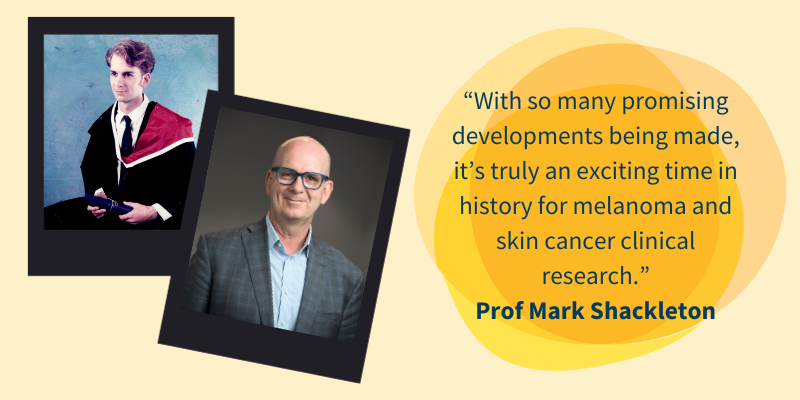As a young doctor, Prof Mark Shackleton – now one of Australia’s leading medical oncologists – was focused on becoming a neurologist. It was only later in his medical training that Prof Shackleton encountered a ward that profoundly changed everything and set him on a path to become an expert in melanoma and skin cancer, and a champion of clinical trials.
“One of my last rotations as a junior doctor just happened to be on an oncology ward. Outside of my studies, I’d never given much thought to that side of medicine, but the more I was exposed to people with cancer the clearer it became that oncology was where I was meant to be. The psycho-spiritual and existential aspects of cancer – people having to deal with profoundly challenging situations they’ve been thrust into through no fault of their own – really struck me. Those, as well as the exciting emerging advances in cancer research at the time, were more than enough to compel me – I knew I had to do all I could to improve patient outcomes.”
After that revelation, Prof Shackleton threw himself into medical oncology research, securing a subspecialist position that focused on novel treatments towards the end of his training. This was the 1990s: an exciting time for a young doctor at the cutting-edge, with treatments like targeted therapies, immunotherapy, and cancer vaccines showing early promise. And so, surrounded by mentors and other enthusiastic researchers, Prof Shackleton began to establish a reputation for himself.
“After my PhD at the Walter and Eliza Hall Institute, I took a postdoctoral research position specialising in melanoma at the University of Michigan in the USA. With amazing colleagues, I was lucky enough to drive some innovative research that generated positive results and media attention. We were making real progress and that was encouraging, particularly as I remembered the patients and their families I’d met on oncology wards, and the huge impact this research could have on them – and future generations of patients.”

Cancer research during this time was rapidly evolving. From the development of tablet-based therapies that targeted mutated BRAF proteins to the subclassification of various types of cancers, this era was punctuated by several watershed discoveries. And then came immunotherapy.
“For over 100 years, people had understood there was a link between the immune system and cancer, and that not all cancers and immune systems interact in the same way. Thanks to technological advancements and back-breaking research, and despite sometimes marginal funding, truly revolutionary breakthroughs were happening through the 80s, 90s and 2000s that led to what we now know as anti-cancer immunotherapy. As is the way with research, those learnings catalysed advancements that we’re still benefitting from.”
Now, as Board Chair of Melanoma and Skin Cancer Trials, and holding several senior leadership positions in the medical oncology world, Prof Shackleton can reflect on the significant advancements he has contributed to throughout his extraordinary career.
“I’ve been fortunate enough to be at the bleeding-edge of oncology research since the early stages of my career. It’s a real privilege to think some of the research we did in the immunotherapy space in the 1990s has led to where we are today.”
Prof Shackleton highlights that it’s not only medical staff who should receive the credit for improved patient care.
“From the trailblazers like dedicated laboratory researchers and past clinical trialists whose ground-breaking discoveries pave the way, through to the thousands of professionals working to deliver clinical trials, and the industry leaders and generous philanthropists who support our endeavours, their collective efforts continue to shape our progress. With so many promising developments being made, it’s truly an exciting time in history for melanoma and skin cancer clinical research.”


